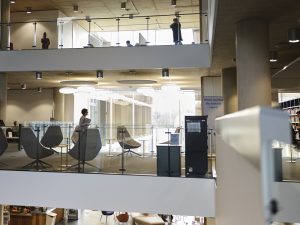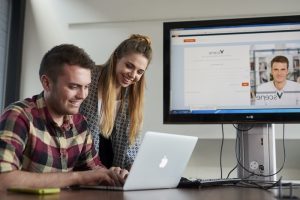“An interesting, informative, and practically focused event”
Our first joint building digital capability and digital experience insights community of practice was originally due to be a face-to-face event kindly hosted by the University of Northampton at their Waterside Campus. Unfortunately, that was not to be, but Rob Howe, head of learning technology at the University of Northampton worked with us to build an engaging and relevant online programme (opens in new window) for the day.
A record number of participants and broad sector participation
325 people registered for the event including several overseas participants from Australia, New Zealand, South Africa and the USA. Actual attendance for the live event peaked at 190 and remained in the high 180s with very active participation throughout the day.
Moving online not only made it possible for more people to attend but also broadened reach in terms of the range of settings and participant roles: we had strong participation from UK further and higher education but also from secure learning providers, adult and community learning and others.
Feedback at the end of the event indicated a preference for joint building digital capability and digital experience insights events in the future (joint 61%, one of each 31% and separate 8%) and for alternate face-to-face and online meetups (alternate 62%, online 33% and F2F 5%) – something the team will take into consideration when planning the next event.
Sharing effective practice
(all presentations available from our event page (opens in new window))
Sharing effective practice is at the heart of the community of practice and we were treated to seven different perspectives covering organisational, staff and student perspectives.
Raising the quality curve at Northampton
 Our keynote was presented by Professor Ale Armellini (dean of learning and teaching) and Rob Howe (head of learning technology). Ale and Rob shared the principles that the university have developed and refined that guide their practices – a focus on actively thinking and doing, and that context, not content is king. Their definition of active blended learning (ABL) (opens in new window) and how the definition is still evolving was of great interest to the community.
Our keynote was presented by Professor Ale Armellini (dean of learning and teaching) and Rob Howe (head of learning technology). Ale and Rob shared the principles that the university have developed and refined that guide their practices – a focus on actively thinking and doing, and that context, not content is king. Their definition of active blended learning (ABL) (opens in new window) and how the definition is still evolving was of great interest to the community.
Although work to transform digital learning has helped Northampton to move rapidly in response to Covid-19, Rob shared some of the challenges the team experienced and how they are tackling these, for example: supporting colleagues to redesign their teaching and blend synchronous and asynchronous activities; using up to date data from the university’s participation in Jisc’s student and teaching staff digital experience insights surveys (opens in new window) to understand needs and shape specific support; improving the virtual learning environment user experience, and; developing digital capabilities.
Focus on supporting staff
 Our next three member stories focused on how organisations are supporting staff with digital capabilities and to make the most of the digital environment:
Our next three member stories focused on how organisations are supporting staff with digital capabilities and to make the most of the digital environment:
Digital learning – building staff digital capabilities
Ciara Duffy, centre manager at South West College Centre for Excellence outlined their two-year journey to improve staff and student digital skills. From exploring and adapting the Jisc digital capabilities framework (opens in new window), piloting a diagnostic tool for staff and developing a digital capabilities toolkit – culminating in the development of a level 3 qualification in digital skills for educators and a multi-faceted and supportive a delivery model.
Using staff and student technology enhanced learning (TEL) narratives to inform change
Rod Cullen, senior lecturer in learning and teaching technologies at Manchester Metropolitan University gave a thoughtful presentation on how the university is using a range of data sources and focus group to construct a series of narratives around their staff and student experience of TEL. These narratives are informing their development of a digital education strategy and an accelerated digital education programme.
Preparing for the ‘new normal’
Gordon Duffy-McGhie, director – teaching, learning and student development at Middlesbrough College reflected how Covid-19 has presented an opportunity to engage staff and students in pedagogic discussions and explore what authentic online delivery could look like. Staff use of the discovery tool (opens in new window) has revealed varying levels of digital competency and the college is using curated resources, the Microsoft Innovative Educator programme, and the Google Smart Assessor Champion programme and building staff engagement into the appraisal process.
Focus on supporting students
 Our second set of member stories focused on how organisations are supporting students with digital capabilities and to make the most of the digital environment:
Our second set of member stories focused on how organisations are supporting students with digital capabilities and to make the most of the digital environment:
Introduction and implementation of a digital capabilities framework
Ruth Cameron, digital capabilities project officer (library) from the University of Newcastle (Australia) shared how the university is implementing a digital capabilities framework for students. Equity and employability are two pillars underpinning their approach. Based on the Jisc digital capabilities framework (opens in new window), the university created a graduate statement using examples from the learner profile (opens in new window) as illustrations. An advisory group comprising faculty, careers and library representatives helped to engage all stakeholders. The student digital experience insights survey (opens in new window) also provided evidence to support planning.
Introducing students to Digital Capabilities Online
Joel Miller, education intern; Irina Niculescu, educational developer and digital capabilities manager; Cara Beard, education intern; Sam Hopkins, teaching fellow in learning development; and Jessica Le, education intern from the University of Surrey outlined how an interactive online workshop created through a student-staff partnership was used to tailor the introduction of digital capabilities to suit the specific context of a group of biosciences foundation year students. Students were able to explore the discovery tool (opens in new window) in a focused and supported way.
How we prepare our students for the world of work
Louise Gotch, project manager, and Susan Odev, head of employability and skills at Canterbury Christ Church University (CCCU) shared how the university is increasing the self-confidence and employability of students by developing their digital knowledge and capabilities and building these into student practice. A digital capabilities framework aligned to the IT strategy, a careers and enterprise hub and a digital bootcamp week are key elements of their strategy. The university is also recruiting a team of student digital ambassadors across the university.
The generosity of the presenters and the wider community in sharing both their successes and challenges was much appreciated.
“Insightful with fascinating points raised and lots of really interesting ideas”
“Many thanks for such an informative event – I am leaving inspired with lots of ideas….”
Service update
Building digital capability
- We now have 15,965 users from 60 subscribed organisations using the discovery tool (opens in new window)!
- A new question set will be launched in September for teaching staff in FE and HE to enable them to self-assess their capability and confidence to plan, design, deliver and assess learning online
Our new institutional data dashboards are now available in the discovery tool (opens in new window) - We have mapped LinkedIn Learning resources to our framework and discovery tool (opens in new window) question sets – available on the service website from mid-June 2020
Digital experience insights
- 39,807 student responses to our 2019-20 survey
- Over 8,000 professional services and teaching staff responses (surveys close end of June/early July)
- Analysis of the researcher survey pilot has been completed and report will be published in June
- Toolkit for supporting the digital experience of new students (opens in new window)
Work with us to host the next community of practice event
If you are interested in working with us to host the next community of practice event please get in touch with Ruth Drysdale (ruth.drysdale@jisc.ac.uk) (opens in new window).
Let’s work together to transform your digital experience:
Find out more from our service websites:
Building digital capability service: digitalcapability.jisc.ac.uk (opens in new window)
Digital experience insights service: digitalinsights.jisc.ac.uk (opens in new window)
